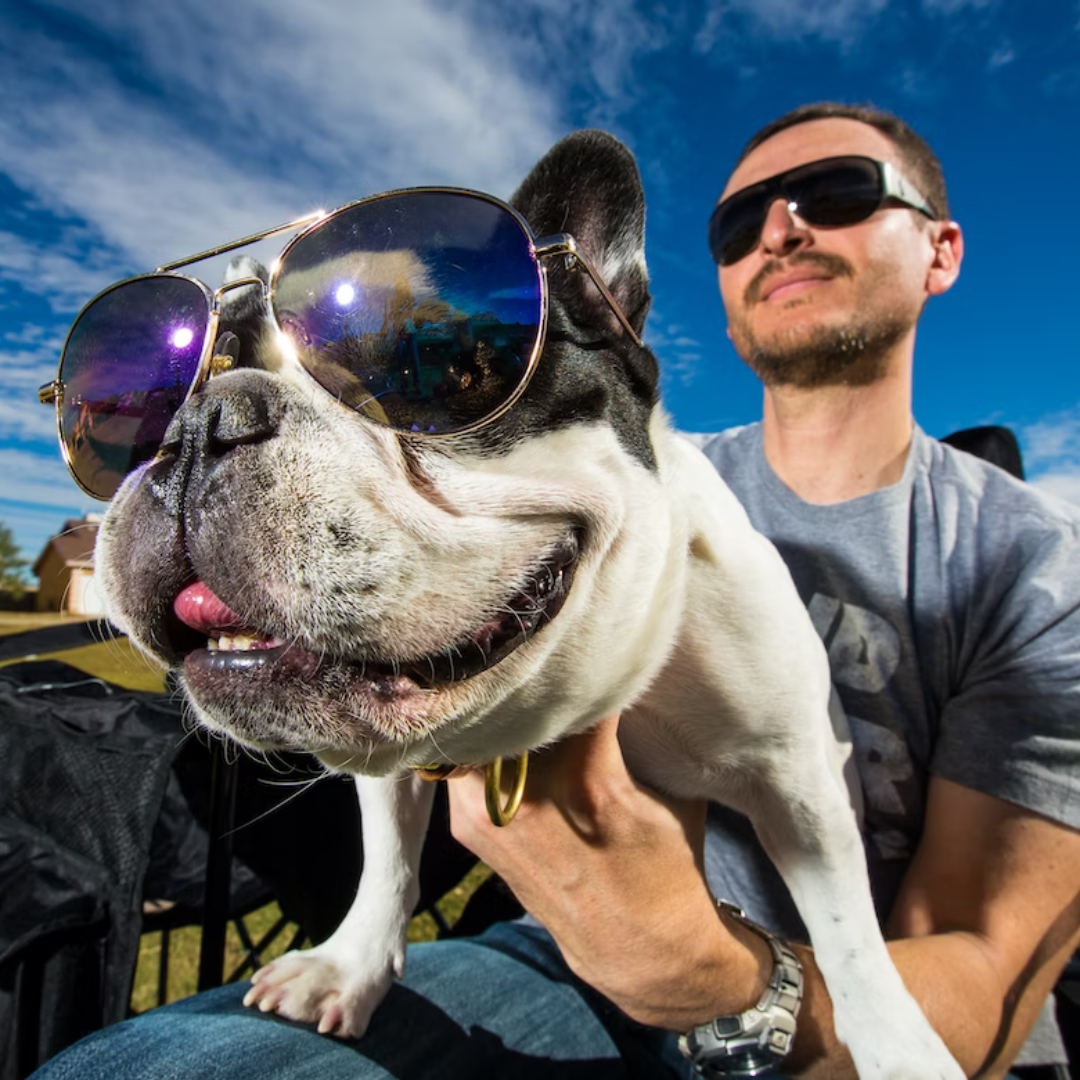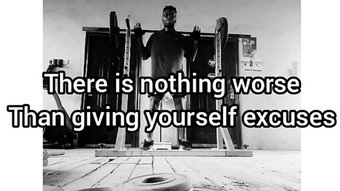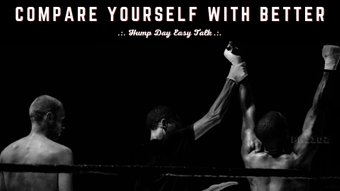Classical conditioning and Exercise (video)
1
About :

What if there was a way to make you feel you were about to exercise? What would that be like?
A lot of us have had that feeling of anxiety in school when the gym/school coach blows the whistle and it is our turn to the “thing”. You haven’t even started bouncing the ball or doing the squats or punching the bag and you already feel your heart racing. Once you start, it becomes even more difficult. But the point is you associated your PE teacher's whistle with the activity you were about to do.
The phenomenon I just described is called classical conditioning and it is not special to humans. Many animals possess the ability to respond this way to stimulus, you just need to “program them”.
If you want to program your mind so that you can easily switch into a workout mood whenever you need it then I’m glad to let you know that not only is it possible but scientists have been doing it to animals. For the animals, however, it wasn’t a workout mood but I’m sure by now you catch my drift.
We are going to look at who is known as the father of classical conditioning, (Ivan Pavlov) and how you can apply these techniques to our more complex minds. It is important to know that with conditioning the animal that is being programmed is different from the animal (human) programming. As humans, we are so complex that we can function as both.

A scientist was working tirelessly to come up with the next big thing in the fitness industry experimenting on dogs. The dog lovers are all coming up with hashtags to cancel him on Twitter but in real life he doesn’t care cause it’s the 1890s and there is no Twitter and cancel culture has not become the loudest one in the room.
Ivan Pavlov used a surgically implanted salivary fistula to know when the dogs were salivating. He experimented on this so many times and in many scenarios that he could indirectly cause the dogs he worked on to salivate.
How did he do this? Ivan believed he could alter a dog’s physiology through an unrelated sense organ. He had already noticed before his experiment that his dogs would salivate whenever they anticipated food. Now all he needed to do was prove that it was possible.
Ivan would ring a bell before feeding his fistulated dog and several times (too numerous to count) the dog eventually started to salivate whenever it heard the sound of the bell.
Eureka!! He had found it!! But what does this have anything to do with your fitness? How does the knowledge of the fact that ringing a bell for a dog countless times before feeding it have anything to do with exercise?

Yeah, even though some people don’t do a good job at differentiating themselves from dogs, we all have conditioned reflexes that are attached to different activities.
Not to stray too far away from Ivan’s dog, most of us salivate when we smell food and closer to the experiment we salivate when our mom calls us downstairs because dinner is ready.
Now that you can see a little bit of conditioning in yourself the next question is how can this help you with your fitness?
The first thing you need to know is that our bodies hate to be fit. Our mind and body are in a constant fight with our self-improvement and sometimes we might need a little bit of help winning this battle against our mind.
One way to win this battle is to be in the mood to work out.
Even though mood is an emotional thing, there is enough evidence that emotions are energy in motion or simply put, moving your body causes you to have certain emotions.
By now you can see yourself running down the stairs when mom calls for food, but can you see yourself running to the gym because you’ve cued it to a specific external stimulus? No? well, I was hoping you would. If you’ve figured it out you can comment on some of the ways this happens for you.
When I started Pre-university I had not put the stimulus and classical conditioning together. But I had figured out how to make myself move.

This is a picture of my physique at the time Source: Zoom in from an old picture.
I had an alarm that woke me up and prepared me for school. It was a motivational talk by Les Brown. I didn’t know who he was at the time but I stumbled across the video and found a way to make it an audio.
It had that very popular Les Brown signature phrase:
It’s not over until I win!
Most Mornings by 4 a.m. I would wake up, and pick up a dumbbell to that audio as an alarm. I’d roll off my bed to the carpet floor and start doing push-ups. After that, I would pick up the dumbbells and start curling as many reps as I could.
I had made a relationship between exercising and that audio. There were some nights that it happened automatically and in a sleepy state, I would be carrying a dumbbell before I realized I’d so far gone in my triceps biceps program.
After listening to Les Brown’s It’s Not Over Story, I would continue my workout with a rap song.
All this while I was using auditory stimuli to condition the behaviour I wanted and any time I hear the stimulus I changed my mood. My emotions changed. I was and still am, an animalbeing given that the sound stimulus was the main thing that made me change my emotions.
One argument against how related this example I have given is the fact that the music did not make me salivate, well my desired activity was not to salivate. However the sound stimulus changed my physiological state. From being in REM sleep and breathing slowly within seconds, I would be awake and ready to go. With a new state of consciousness and a change in my breathing pattern, I would get out of bed straight into push-ups. One could even argue that my heart rate must have gone up once the stimulus came in.
Speaking of salivating though, given that Les Brown’s speech had overridden my sympathetic system, you could also argue that the sound could have had an effect on my salivary glad, but not in a way that you would expect with Ivan’s dog. My animalbeing salivary glad would have the opposite response to the rest and digest response seen with Ivan’s dogs.
The animalbeing in me would go into fight and flight and my cortisol levels would reach peak levels as I prepare myself for the workout that would be set for me.

This is a picture of my physique at the time Source: Zoom in from an old picture.
Ok, so we’ve been able to point out the ways classical conditioning relates to sound with Ivan’s dog and in my own story. In these examples from Ivan’s dog and my physiology, you might be able to see how having auditory stimuli can be helpful.
You could try using music instead of using Lez Brown's motivational talk. Try some really motivational songs in whatever genre that you like. Initially, I think the words of the lyrics will motivate you to keep pushing but eventually, you will find that even the sound of the first note or beat might change your mood.
It happened to me with the music I used to train. I could be feeling down and all of a sudden I’m back to work on the most important project in front of me.
If music doesn’t work for you, maybe we could try Ivan’s bell.
There are other options though. For some people it's their sweet pre-workouts. Immediately after they taste their pre-workout, they are ready to head out to the gym and get the work done. For others, it’s the bitter taste of coffee to sets them into gear.
Maybe yours might be beating on your chest like the animalbeing that you’ve always known yourself to be. That would be a tactile stimulus and so far as this topic is concerned it’s allowed just be careful not to inflict self-harm and we’re ready.
Some people need to look at a picture of their fave or spiritual leader or a loved one who believes in them, hey look, I’m not here to tell you what you should do to get the work done, I’m just the guy who hopes the work is being done.
How many players kiss their fingers before entering the field, regarding the spiritual aspect? How many of them have to look at the chaplet for inspiration?
What’s so weird about stacking the stimulus conditioning is that it the order should not matter. Some people use exercise to get themselves to read. They first wake up and start skipping because they know it sets them in the mood, then they take a shower and get straight to the table to start reading.
In a way, it doesn’t really matter the order, what matters is the hard task that is being done.
More of it not mattering: after I finished my chest and arm programs, I would take a shower and start to read. That was how I destroyed my Joint Academic and Matriculation Board JAMB exam when I was in pre-university.
After 365 days of doing that with a 20% failure rate (stats, straight out of my bum) at exercising and reading. The day before JAMB I needed the break, so I went to play video games at a neighbor’s place. I made a score above 60%, and got into medical school on the merit list.

Source
There are two states where people exist: the struggling and the thriving.
The struggling phase in anything is when you need help to survive, you need that urgent 2k, you need that shoulder to lean on and if these scaffoldings are not available, you might die. Translating that to your fitness journey, some people need these scaffoldings or conditioning, or else their fitness journey will die.
In order to exist outside all of that, you need to build yourself to where you no longer need these systems to survive. At some point, when your phone is not fully charged or you’re out of protein or you are tired of beating your chest or seeing pictures that motivate you, you should still be able to go.
The music is a crutch always remember that. It will always be better to not need these cues and scaffoldings that build around our fitness than to actually need them. The guy who wakes up from bed wears his running clothes and hits the road as soon as he wakes up will always outdo the guy who has to find his earbuds first.
If you live in a country like Nigeria where there are so many variables between turning on your music app and pressing play on your workout playlist, you need to build a stronger sense of presence so that you don’t need these crutches to stay working out.
I read about pro athletes who use music while training and play a particular song before the game. For some of them, it’s a superstitious belief, but for others, it works well as a classic conditioning. Regardless if it cranks your boat, I’m all for it.
Realistically speaking the only competition you have in life is the man in the mirror. So long as you are doing the best in the situation you are given and strive for the best, I stand for that behavior. You only get better by doing better.
So get out there, do your thing, don’t let anybody stop you even if what’s trying to stop you is some classical conditioning. Peace!
References
Tags :
Their limit for today is $0!






























Comments:
Reply:
To comment on this video please connect a HIVE account to your profile: Connect HIVE Account